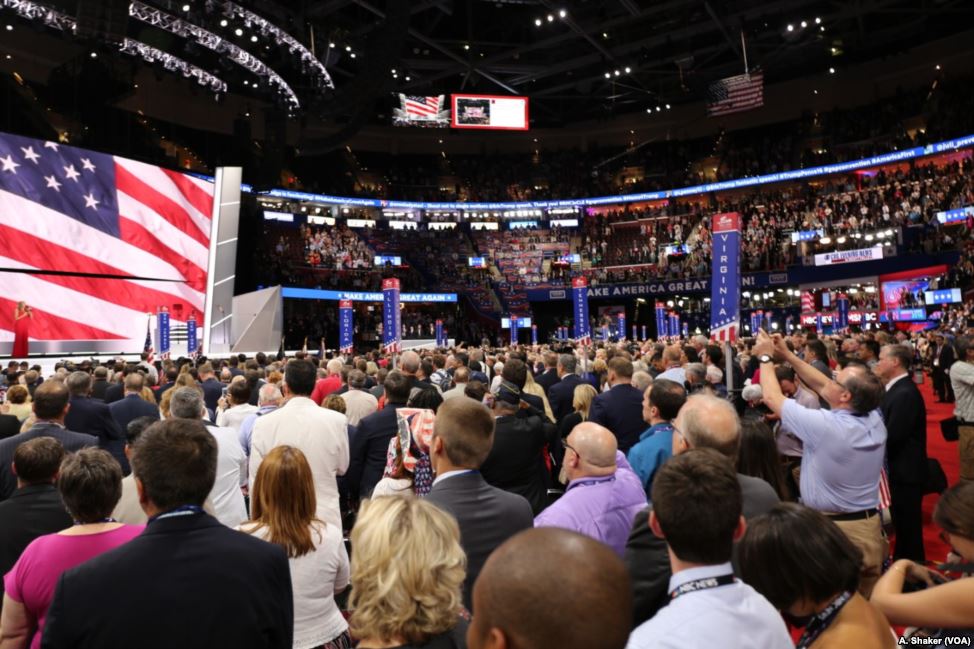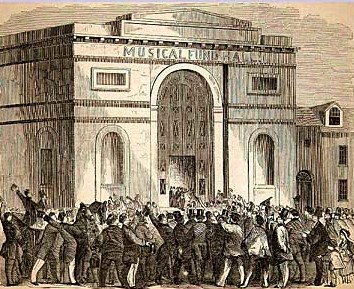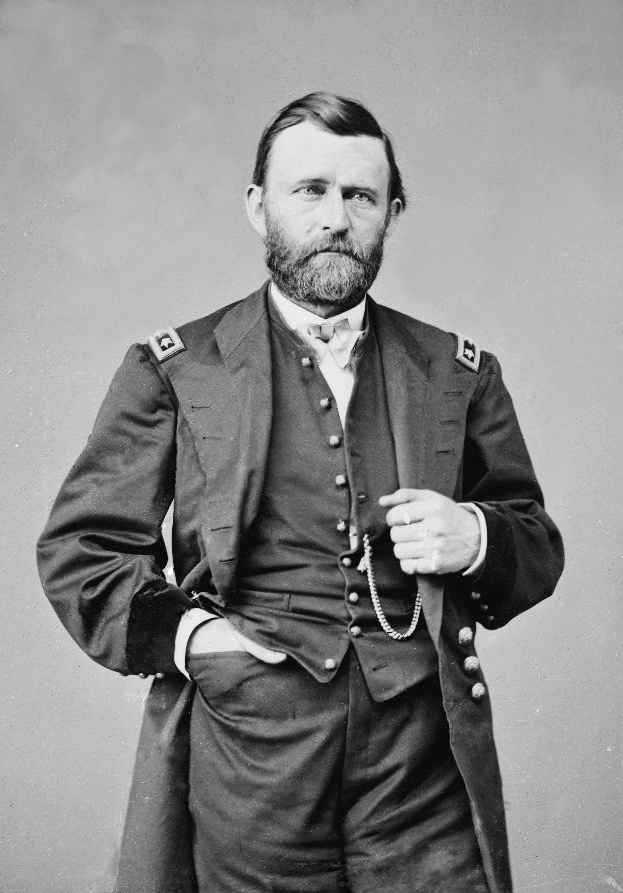|
John W. Hazelton
John Wright Hazelton (December 10, 1814, Mullica Hill, New Jersey – December 20, 1878, Mullica Hill), was an American Republican Party (United States), Republican Party politician, who served in the United States House of Representatives, where he represented New Jersey's New Jersey's 1st congressional district, 1st congressional district from 1871 to 1875. Early life and education Hazelton was born in Mullica Hill, New Jersey (within Harrison Township, New Jersey, Harrison Township) on December 10, 1814. He attended the common schools and engaged in agricultural pursuits. Political career He was a delegate to the Republican National Convention in 1856 Republican National Convention, 1856 and 1868 Republican National Convention, 1868. Hazelton was elected as a Republican to the Forty-second and Forty-third Congresses, serving in office from March 4, 1871 – March 3, 1875, but was an unsuccessful candidate for reelection in 1874 to the Forty-fourth Congress. Later career a ... [...More Info...] [...Related Items...] OR: [Wikipedia] [Google] [Baidu] |
New Jersey
New Jersey is a U.S. state, state in the Mid-Atlantic States, Mid-Atlantic and Northeastern United States, Northeastern regions of the United States. It is bordered on the north and east by the state of New York (state), New York; on the east, southeast, and south by the Atlantic Ocean; on the west by the Delaware River and Pennsylvania; and on the southwest by Delaware Bay and the state of Delaware. At , New Jersey is the List of U.S. states and territories by area, fifth-smallest state in land area; but with close to 9.3 million residents, it ranks List of U.S. states and territories by population, 11th in population and List of U.S. states and territories by population density, first in population density. The state capital is Trenton, New Jersey, Trenton, and the most populous city is Newark, New Jersey, Newark. With the exception of Warren County, New Jersey, Warren County, all of the state's 21 counties lie within the combined statistical areas of New York City or Delaw ... [...More Info...] [...Related Items...] OR: [Wikipedia] [Google] [Baidu] |
William Moore (congressman)
William Moore (December 25, 1810, Norristown, Pennsylvania – April 26, 1878, Mays Landing, New Jersey), was an American Republican Party politician, who served in the United States House of Representatives, where he represented New Jersey's 1st congressional district from 1867 to 1871. Moore was born in Norristown, Pennsylvania on December 25, 1810. He attended private schools for a short time, became engaged in mercantile pursuits and later in ironworks. He moved to New Jersey in 1845 and settled in Atlantic County, New Jersey at Weymouth Furnace or Weymouth Works in Hamilton Township, Atlantic County, New Jersey, working as the manager for Stephen Colwell. He engaged in the iron business there, and also became interested in the building and sailing of vessels and in the development of banks and other financial institutions. He was a judge of the Court of Common Pleas for Atlantic County from 1855 to 1865. He was one of the founders of the Republican Party and a delegate to ... [...More Info...] [...Related Items...] OR: [Wikipedia] [Google] [Baidu] |
Clement Hall Sinnickson
Clement Hall Sinnickson (September 16, 1834 – July 24, 1919), was an American Republican Party politician, who served in the United States House of Representatives, where he represented New Jersey's 1st congressional district from 1875 to 1879. He is the grandnephew of Thomas Sinnickson, who was also a former Representative from New Jersey. Born in Salem, New Jersey, he attended private schools, and the Rensselaer Polytechnic Institute, before graduating from Union College, New York, in 1855. While at Union he became a member of Theta Delta Chi. After his collegiate career, he studied law, and was admitted to the bar in 1858, commencing the practice of law in Salem. During the Civil War Sinnickson served as Captain in the Union Army. He was elected as a Republican to the Forty-fourth and Forty-fifth United States Congresses, serving in office from March 4, 1875, to March 3, 1879. After his stint in Washington, he resumed the practice of law in Salem. He also served as a d ... [...More Info...] [...Related Items...] OR: [Wikipedia] [Google] [Baidu] |
Mullica Hill, New Jersey
Mullica Hill is a census-designated place (CDP) and unincorporated community in Harrison Township in Gloucester County, New Jersey. As of the 2010 United States census, the CDP's population was 3,982.DP-1 - Profile of General Population and Housing Characteristics: 2010 Demographic Profile Data for Mullica Hill CDP, New Jersey . Accessed November 10, 2012. History [...More Info...] [...Related Items...] OR: [Wikipedia] [Google] [Baidu] |
Republican Party (United States)
The Republican Party, also referred to as the GOP ("Grand Old Party"), is one of the two major contemporary political parties in the United States. The GOP was founded in 1854 by anti-slavery activists who opposed the Kansas–Nebraska Act, which allowed for the potential expansion of chattel slavery into the western territories. Since Ronald Reagan's presidency in the 1980s, conservatism has been the dominant ideology of the GOP. It has been the main political rival of the Democratic Party since the mid-1850s. The Republican Party's intellectual predecessor is considered to be Northern members of the Whig Party, with Republican presidents Abraham Lincoln, Rutherford B. Hayes, Chester A. Arthur, and Benjamin Harrison all being Whigs before switching to the party, from which they were elected. The collapse of the Whigs, which had previously been one of the two major parties in the country, strengthened the party's electoral success. Upon its founding, it supported cl ... [...More Info...] [...Related Items...] OR: [Wikipedia] [Google] [Baidu] |
United States House Of Representatives
The United States House of Representatives, often referred to as the House of Representatives, the U.S. House, or simply the House, is the lower chamber of the United States Congress, with the Senate being the upper chamber. Together they comprise the national bicameral legislature of the United States. The House's composition was established by Article One of the United States Constitution. The House is composed of representatives who, pursuant to the Uniform Congressional District Act, sit in single member congressional districts allocated to each state on a basis of population as measured by the United States Census, with each district having one representative, provided that each state is entitled to at least one. Since its inception in 1789, all representatives have been directly elected, although universal suffrage did not come to effect until after the passage of the 19th Amendment and the Civil Rights Movement. Since 1913, the number of voting representat ... [...More Info...] [...Related Items...] OR: [Wikipedia] [Google] [Baidu] |
New Jersey's 1st Congressional District
New Jersey's 1st congressional district is a congressional district in the U.S. state of New Jersey. The district, which includes Camden and South Jersey suburbs of Philadelphia, has been represented by Democrat Donald Norcross since November 2014. It is among the most reliably Democratic districts in New Jersey, as it is mainly made up of Democratic-dominated Camden County. Counties and municipalities in the district For the 118th and successive Congresses, based on redistricting following the 2020 census, the district contains all or portions of three counties and 52 municipalities. New Jersey Redistricting Commission, December 23, 2021. Accessed November 5, 2022. ; |
Harrison Township, New Jersey
Harrison Township is a township in Gloucester County, in the U.S. state of New Jersey. As of the 2010 U.S. census, the township's population was 12,417, reflecting an increase of 3,629 (+41.3%) from the 8,788 counted in the 2000 census. Harrison Township was originally formed as Spicer Township by an act of the New Jersey Legislature on March 13, 1844, from portions of Greenwich Township and Woolwich Township. That name lasted for less than a year, with Harrison Township adopted as of April 1, 1845.Snyder, John P''The Story of New Jersey's Civil Boundaries: 1606-1968'' Bureau of Geology and Topography; Trenton, New Jersey; 1969. p. 139. Accessed October 26, 2012. The township was named for President William Henry Harrison. Since the institution of Prohibition, Harrison had been a dry township, where alcohol could not be sold. The township's voters passed a referendum in 2009 permitting alcohol by consumption (in a restaurant). A second referendum was passed by the voters ... [...More Info...] [...Related Items...] OR: [Wikipedia] [Google] [Baidu] |
Republican National Convention
The Republican National Convention (RNC) is a series of presidential nominating conventions held every four years since 1856 by the United States Republican Party. They are administered by the Republican National Committee. The goal of the Republican National Convention is to officially nominate and confirm a candidate for president and vice president, adopt a comprehensive party platform and unify the party, as well as publicize and launch the fall campaign. Delegates from all fifty U.S. states and from American dependencies and territories such as Puerto Rico and the Virgin Islands attend the convention and cast their votes. Like the Democratic National Convention, the Republican National Convention marks the formal end of the primary election period and the start of the general election season. In 2020 all parties replaced the usual conventions with short online programs. Delegations The party's presidential nominee is chosen primarily by pledged delegates, which are in tu ... [...More Info...] [...Related Items...] OR: [Wikipedia] [Google] [Baidu] |
1856 Republican National Convention
The 1856 Republican National Convention was a presidential nominating convention that met from June 17 to June 19 in Philadelphia, Pennsylvania. It was the first national nominating convention of the Republican Party, which had been founded two years before, and was held to nominate the party's candidates for president and vice president in the 1856 election. The convention selected former Senator John C. Frémont of California for president and former Senator William L. Dayton of New Jersey for vice president. The convention also appointed the members of the newly-established Republican National Committee. The Republican Party had been organized by opponents of the expansion of slavery in the territories following the passage of the 1854 Kansas–Nebraska Act. With William Seward, Salmon P. Chase, and Charles Sumner all taking their names out of consideration, Frémont entered the Republican convention as the front-runner for the presidential nomination. Frémont ... [...More Info...] [...Related Items...] OR: [Wikipedia] [Google] [Baidu] |
1868 Republican National Convention
The 1868 Republican National Convention of the Republican Party of the United States was held in Crosby's Opera House, Chicago, Cook County, Illinois, on May 20 to May 21, 1868. Ulysses S. Grant won the election and became the 18th president of the united states. Commanding General of the U.S. Army Ulysses S. Grant was the unanimous choice of the Republicans for president. At the convention he was unopposed and chosen by acclamation on the first ballot. For vice president the delegates chose Speaker Schuyler Colfax, who was Grant's choice. In Grant's acceptance telegram, a letter to then President of the Republican National Convention Joseph R. Hawley, Grant said "Let us have peace", which captured the imagination of the American people. Presidential candidates Withdrew before convention File:Samuel Portland Chase.jpg, File:Benjamin Wade - Brady-Handy.jpg, Presidential balloting Vice Presidential candidates * Benjamin F. Wade (Ohio) * John A. J. Creswe ... [...More Info...] [...Related Items...] OR: [Wikipedia] [Google] [Baidu] |
The Political Graveyard
The Political Graveyard is a website and database that catalogues information on more than 277,000 American political figures and political families, along with other information. The name comes from the website's inclusion of burial locations of the deceased (when known). It is also a pun; where bodies are buried can refer to the politicians accused of crimes or touched by scandal. History The site was created in 1996 by Lawrence Kestenbaum, then an academic specialist at Michigan State University, and later on staff at the University of Michigan. Kestenbaum was formerly a county commissioner, and in 2004 was elected to be County Clerk/ Register of Deeds of Washtenaw County, Michigan. The site and its underlying database were developed from a personal interest triggered by the ''Biographical Directory of the U.S. Congress'', which was its original data source. Since then his personal research, and the information contributions of hundreds of volunteers have greatly expanded ... [...More Info...] [...Related Items...] OR: [Wikipedia] [Google] [Baidu] |



